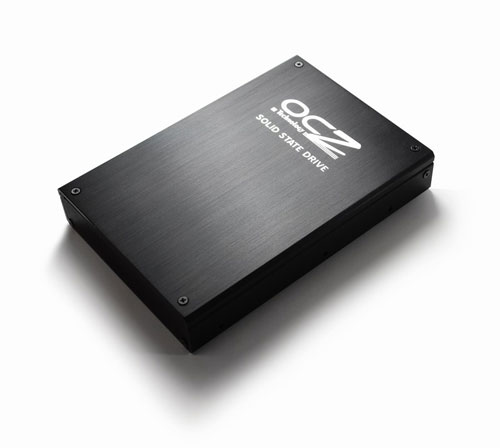OCZ Teases Faster SSD Controller, Remains Mum on Rumors
OCZ is making a lot of waves these days. In its CQ2 conference call, the company confirmed that its Barefoot controller should be returning in sample form from the contract fab shortly.
There were encouraging news about its business situation as well, and Seagate is now rumored to be in talks to acquire the company.
CEO Ryan Petersen told analysts the next-generation Barefoot 3 controller is on TSMC's production lines and samples may become available in the coming weeks. Sample shipments should be taking place by August or September and full availability is scheduled for the fourth calendar quarter. Petersen said that Barefoot 3 "will support a significant performance increase over [OCZ's] current products". It integrates OCZ's 400 MHz Aragon processor to run "an SSD specific risk instruction set, allowing most instructions and branches to be executed in a single cycle." The executive promised "a world of new possibilities for game changing SSD solutions as it supports unprecedented levels of processing power."
Aside barefoot 3, OCZ said that it had almost $140 million in bookings in the second quarter and a revenue increase of 54 percent over the same quarter last year. A big portion of OCZ's sales came from the Vertex 4 and Agility 4 SSDs, which shipped more than 100,000 units during the quarter. However, the company said that the PSU business is problematic due to "headwinds in terms of both revenue and gross margins, as sales of desktop PCs which use these products continue to dwindle."
There was some speculation that OCZ may be acquired by Seagate in the near future. In fact, OCZ has been streamlining its business lately and has trimmed its quarterly loss to $6.3 million in CQ2, down from $9.1 million last year. OCZ's cash base has been cut more in half from the first quarter and now stands at just $43.2 million. OCZ's market cap has increased by almost 30 percent over the past week based on the acquisition rumors, and lifted the company's stock value to about $405 million.
Neither Seagate nor OCZ commented on the rumors.
Get Tom's Hardware's best news and in-depth reviews, straight to your inbox.

Douglas Perry was a freelance writer for Tom's Hardware covering semiconductors, storage technology, quantum computing, and processor power delivery. He has authored several books and is currently an editor for The Oregonian/OregonLive.
-
apache_lives OCZ instead of making a faster SSD, hows about making one that is reliable and works FIRST go not requiring 10+ firmware updates to "fix" i expect things to work out of the box its a joke.Reply -
RazorBurn If ever Seagate acquires OCZ, and brings its Great Realibility for their SSD.. All my future SSD purchases will go with it..Reply -
unksol "OCZ teases new SSD controller release, higher speeds by 2013: reliable firmware anticipated by 2015"Reply
an SSD specific risk instruction set, allowing most instructions and branches to be executed in a single cycle
Normally I'd expect it to be a RISC instruction set, but with OCZ I'm willing to believe it's a "risk" instruction set. makes sense with them, and after all it's a quote from the CEO -
thuan #Correction:Reply
an SSD specific RISC instruction set
Still even with that correction what the CEO talked is more about PR than actual technology. There's no SSD specific instruction set. there's only instruction set optimized for SSD. -
jaquith I've seen enough 'storage' mergers for my comfort level, and I see no upside as a consumer. My concern is another opportunity for increasing the prices.Reply
Samsung currently is the only company that manufactures both its Controllers & NAND. So it makes me wonder what acquisition Seagate is targeting now for NAND manufacturing. -
kaisellgren apache_livesOCZ instead of making a faster SSD, hows about making one that is reliable and works FIRST go not requiring 10+ firmware updates to "fix" i expect things to work out of the box its a joke.Well if they could come up with a way to automatically apply firmware updates (although I do not know how it would happen exactly), then I see now problems in this regard. I kind of wish BIOS and firmware updates were automatically applied.Reply -
unksol Reply9382867 said:Well if they could come up with a way to automatically apply firmware updates (although I do not know how it would happen exactly), then I see now problems in this regard. I kind of wish BIOS and firmware updates were automatically applied.
You mean you want OCZ automatically applying automatic destruction firmware flashes and destroying your Data with no warning? Or.bricking your SSD?
Why not just use.a good controller, good firmware, and release a good SSD? you know. Like Samsung -
shin0bi272 jaquithI've seen enough 'storage' mergers for my comfort level, and I see no upside as a consumer. My concern is another opportunity for increasing the prices.Samsung currently is the only company that manufactures both its Controllers & NAND. So it makes me wonder what acquisition Seagate is targeting now for NAND manufacturing.in the late 1800's and early 1900's Carnegie's U.S. Steel held 96% of all steel manufacturing in the US (and the US had almost 40% of the worlds steel production). He was able to bring the price of steel down from over 200 dollars a ton to 14. So the fears everyone has of monopolies are not always grounded in reality but progressive politician propaganda.Reply -
memadmax kaisellgrenWell if they could come up with a way to automatically apply firmware updates (although I do not know how it would happen exactly), then I see now problems in this regard. I kind of wish BIOS and firmware updates were automatically applied.Reply
That leaves so many security holes open, and more crap will be needed to patch those security holes...
No thanks. -
memadmax shin0bi272in the late 1800's and early 1900's Carnegie's U.S. Steel held 96% of all steel manufacturing in the US (and the US had almost 40% of the worlds steel production). He was able to bring the price of steel down from over 200 dollars a ton to 14. So the fears everyone has of monopolies are not always grounded in reality but progressive politician propaganda.Reply
Thats more true than you realize. Now a days, any time some government "regulation" comes out for some sector of the economy, it's because some company somewhere had enough money to lobby for it and the "regulation" becomes a weapon to snuff out the competition. The earliest signs of this happening was during the "cattle and butcher wars" in chicago during the early 1900's. A few companies payed off the politicians and had them pass "health laws" that successfully destroyed almost the entire industry there(ma and pa stores that sold beef products on corners, cut the stuff in front of you so you knew what you were getting).... Obamacare is another perfect example of this: Big insurance companies dumped millions into lobbying for it. Now that the law has passed, a few hundred of the smaller health insurance companies have already been shuttered, with a couple thousand workers now unemployed....
